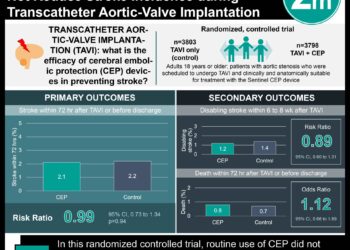2 Minute Medicine Rewind October 3, 2022
1. A healthy lifestyle defined by diet, smoking status, physical activity, alcohol consumption, and BMI was associated with better mental health outcomes.
Evidence Rating Level: 2 (Good)
It is well known that unhealthy lifestyles are associated with adverse health outcomes such as cardiovascular disease, respiratory illness, and mental health disorders. While many studies have examined individual health behaviors and their effects on health, the synergistic effects of multiple lifestyle modifications on mental well-being have not been thoroughly investigated. In this Belgian-based cross-sectional study, 11611 Belgian residents were followed for various mental health and well-being outcomes including psychological distress, life satisfaction, depression and generalized anxiety disorder, and suicidal ideation. For each participant, a lifestyle score including diet, smoking status, physical activity, alcohol consumption and BMI was calculated after a series of interviews. The results of this study showed that an increased lifestyle score was associated with lower odds of mental health outcomes assessed within this study. Specifically, a higher lifestyle score was associated with lower odds of psychological distress (OR 0.69, 95%CI 0.64-0.75) and low life satisfaction (OR 0.62, 95%CI 0.56-0.68). Additionally, the odds of a diagnosed depressive disorder, generalized anxiety disorder, or suicidal ideation were lower among individuals with a higher lifestyle score (OR 0.57, 95%CI 0.51-0.63; OR 0.63, 95%CI 0.57-0.69; and OR 0.63, 95%CI 0.55-0.72, respectively). In conclusion, this study suggests that having a healthier lifestyle, defined by diet, smoking, alcohol use, physical activity, and BMI was associated with more positive mental health and well-being. This study reaffirms current knowledge that a poor lifestyle is associated with worse mental health outcomes. However, given the cross-sectional nature of this study, it is difficult to discern whether mental health is a consequence of poor lifestyle or whether challenges with mental health can present with an unhealthy lifestyle. Further longitudinal studies exploring this dynamic and confirming this association can be very beneficial.
1. The use of esketamine in combination with propofol significantly reduced the risk of perioperative hypotension during abortive surgery compared to propofol and fentanyl.
Evidence Rating Level: 1 (Excellent)
Opioid analgesics commonly used in anesthesia practice such as fentanyl and propofol are associated with respiratory and circulatory system depression. Esketamine is a N-methyl-D-aspartate receptor (NMDA) antagonist which has a milder respiratory depression effect and lower circulatory excitation compared to its other analgesic counterparts due to its rapid onset and offset action. However, many studies have not explored the effect of esketamine in patients undergoing painless abortion surgery. This prospective, double-blinded, randomized controlled trial divided 180 patients into either the fentanyl and propofol group or one of four esketamine and propofol groups. The primary outcome examined by this study was the incidence of perioperative hypotension. The results showed that the incidence of hypotension was significantly lower in all the groups inducing with esketamine and propofol compared to the fentanyl and propofol group (0% vs 20%, respectively). Additionally, incidence of hypoxia was lower among patients with esketamine compared to fentanyl. In conclusion, this study confirms that various doses of esketamine in combination with propofol significantly reduce the risk of perioperative hypotension during abortive surgery compared to a fentanyl and propofol. However, this study has several limitations. For instance, as esketamine and fentanyl belong to separate drug classes and have differing mechanisms of action, it can be difficult to compare them directly. As well, this study only included one population in its sample, specifically pregnant women undergoing abortive surgery. The effect of esketamine for induction during other surgeries or various patient demographics cannot be determined by these results. Nevertheless, these findings do suggest benefits of esketamine as an adjunctive induction agent to propofol and further research should be conducted examining this drug in different surgical contexts.
1. Ketamine use in patients with treatment-resistant depression resulted in more belief-updating that was optimistically biased.
Evidence Rating Level: 3 (Average)
Major depressive disorder (MDD) continues to be a significant public health concern and is often characterized by maladaptive negative beliefs about oneself and the future. A significant portion of patients with depression do not improve with traditional antidepressant medications, a phenomenon referred to as treatment-resistant depression (TRD). In recent years, ketamine, a N-methyl-D-aspartate (NMDA) receptor antagonist, has been thought to be a treatment option for TRD. However, the effect of ketamine on improving cognitive beliefs is not known. In this observational case-control study, patients with TRD and healthy volunteers were administered ketamine in a clinical care setting. The primary outcome assessed was belief updating which was measured by a specialized belief-updating task. The results of this study showed that after the first ketamine infusion, patients with TRD changed their beliefs more positively than the control group (β = −0.91, 95%CI −1.58 to −0.24). This resultant optimism bias in beliefs was correlated with fewer depressive symptoms that were measured by the Montgomery-Asberg Depression Rating Scale (MADRS) score following one week of treatment. In conclusion, these findings suggest that ketamine may improve cognitive beliefs in patients with treatment-resistant depression. However, several limitations exist in the methodology of this study. Firstly, it is difficult to discern whether ketamine similarly improved optimism bias in the healthy controls as well as the patients with TRD. As well, as participants in this study used ketamine in addition to their pre-existing antidepressant therapies, the drug interactions with ketamine are unknown. Nevertheless, these findings articulating the belief-updating processes of ketamine in treatment-resistant depression are interesting and could have important implications for augmenting psychotherapy.
1. A high-polyphenol Mediterranean diet was associated with an increased reduction in visceral adiposity compared to a standard healthy diet or Mediterranean diet alone.
Evidence Rating Level: 1 (Excellent)
Visceral adipose tissue is known to be associated with an increased risk of cardiovascular disease, type 2 diabetes, and mortality. It has been thought that a Mediterranean diet which is high in polyphenol content can help reduce visceral adipose tissue. In this randomized controlled trial, 294 participants were randomized to either the healthy dietary guidelines group (HDG), the Mediterranean diet group (MED), or the greens-enhanced Mediterranean diet group (green-MED) to assess the effect of a Mediterranean diet further enriched with polyphenols on visceral adiposity. All participants engaged in similar levels of physical activity. The results of this study suggest that the green-MED group had a greater reduction in visceral adipose tissue compared to the other two groups (HDG -4.2%, MED -6.0%, green-MED -14.4%). These differences in visceral adipose tissue loss remained significant after adjusting for age and sex. In conclusion, a green-MED diet which is enriched with polyphenols may be important for visceral adipose tissue reduction. However, this study poses several limitations. Physical activity was recommended to all participants by providing a free gym membership and educational sessions promoting the importance of moderate-intensity physical activity. However, if all participants did not engage in similar levels of consistent exercise throughout the study period, these results may be biased as physical activity is known to promote visceral adiposity reduction. Additionally, participant adherence to each diet was determined through self-reporting which may not necessarily be accurate. Despite this, the conclusions of this study support the role of a polyphenol-rich Mediterranean diet on visceral adiposity which may have significant implications for reducing risk of cardiovascular disease.
1. Age at diabetes diagnosis among adult populations was associated with varying outcomes.
2. Younger age groups were associated with an elevated risk of heart disease, stroke, disability, cognitive impairment, and all-cause mortality compared to older age groups.
Evidence Rating Level: 2 (Good)
Older adults with diabetes are a unique and distinct patient population although these individuals are often treated similarly to middle-aged adults. There is minimal information currently known about the effect of age at diagnosis of diabetes on long-term outcomes among older adults. In this retrospective cohort study, 39,093 participants older the age of 50 were assessed for age at diabetes diagnosis, and several outcomes including heart disease, stroke, disability, cognitive impairment, and mortality. Outcomes were compared with a matched non-diabetes control group. Interestingly, the results showed that for participants diagnosed between the ages of 50 to 59, diabetes was associated with an increased risk of heart disease (HR 1.66, 95%CI 1.40-1.96), stroke (HR 1.64, 95%CI 1.30-2.07), disability (HR 2.08, 95%CI 1.59-2.72), cognitive impairment (HR 1.30, 95%CI 1.05-1.61), and mortality (HR 1.49, 95%CI 1.29-1.71) compared to their matched controls. Individuals diagnosed at age 70 and older only had an elevated risk of mortality compared to matched controls (HR 1.08, 95%CI 1.01-1.17). In conclusion, this study suggests that an earlier diagnosis of diabetes is associated with worse outcomes though the mechanism behind this is not elucidated. This study had several strengths including the large sample size, which allows the study to be more generalized to the broader population. Additionally, the methodology examined current age, age at diagnosis, and duration of diabetes in their assessment of long-term outcomes, which enable stronger correlations to be made. However, further studies should be conducted to explore the long-term effects of age of diabetes diagnosis on health outcomes in older adults.
Image: PD
©2022 2 Minute Medicine, Inc. All rights reserved. No works may be reproduced without expressed written consent from 2 Minute Medicine, Inc. Inquire about licensing here. No article should be construed as medical advice and is not intended as such by the authors or by 2 Minute Medicine, Inc.







